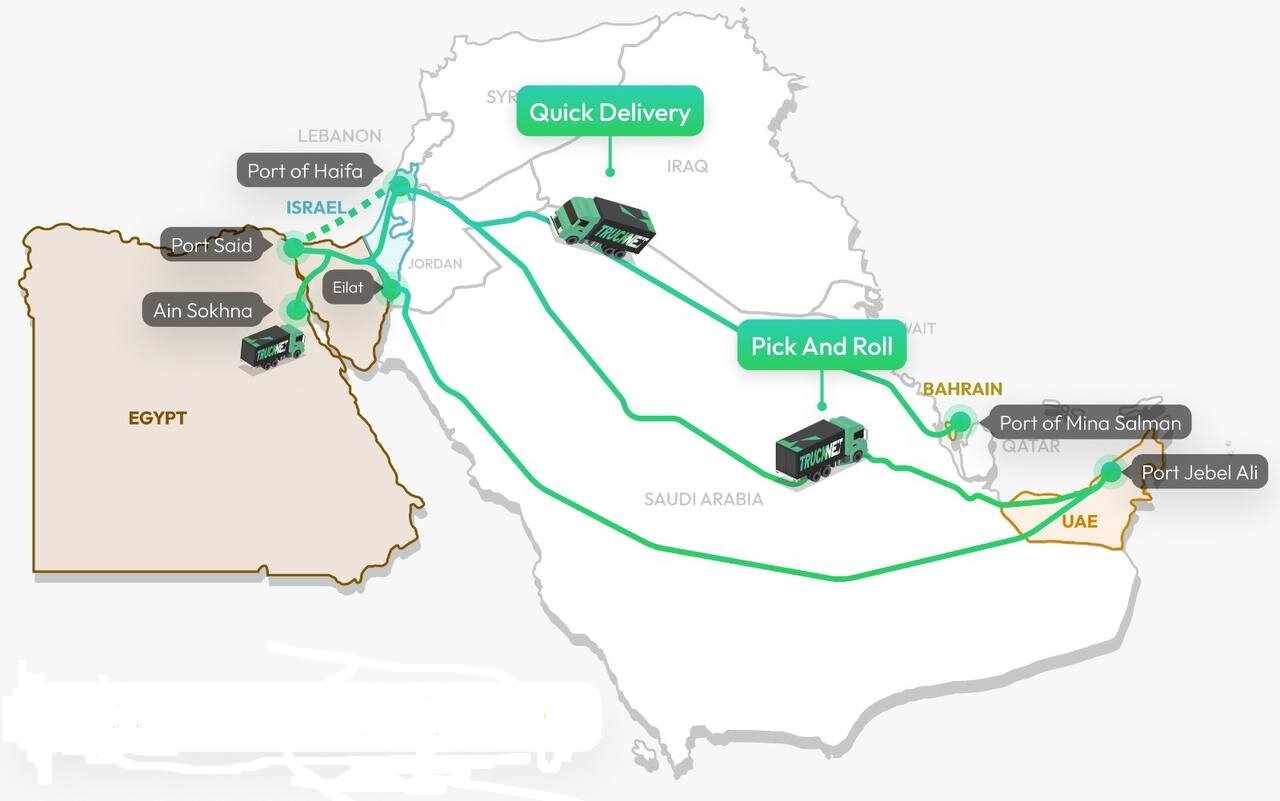The corridor of betrayal
How Israel is using Arab countries' help to bypass the Yemeni blockade in the Red Sea

TEHRAN – On November 19th, as the world was still struggling to take in the sheer brutality of Israel against Palestinians in Gaza, Leader of the Islamic Revolution Ayatollah Seyyed Ali Khamenei called on Islamic countries to cut ties with the regime for at least a “limited period of time” to help save Palestinian lives.
Before governments, people all over the world seemed to follow the advice in a bid to pressure Israel in any way they could. Store shelves in West Asia and beyond began to see an accumulation of Israeli products as citizens refused to spend their money to fund a genocide. Many not only avoided purchasing Israeli-produced goods but also boycotted brands associated with the regime, causing giant companies like Starbucks and MacDonald’s to suffer heavy revenue losses.
Among Arab states, some felt obliged to act against Israeli onslaughts more than others. The biggest display of solidarity toward Palestinians was undoubtedly seen in Yemen. The impoverished country’s Ansarullah movement began to target Israeli ships in the azure depths of the Red Sea, choking off a lifeline extremely vital to Israel - the bustling port of Eliat. Yemen’s courageous stance in support of Gaza, however, did not come at a low price.
Israel’s biggest patrons, the U.S. and Britain, launched airstrikes against Yemeni positions saying they were acting to “protect” the interests of ordinary people. Western media outlets jumped out as stenographers, arguing that Ansarullah’s attacks in the Red Sea would eventually cause prices to surge in the West and hence needed to be dealt with. Nothing though was mentioned about the fact that only Israeli ships were getting targeted and that these attacks too would come to an end once the regime agreed not to kill Palestinians anymore.
The Western aerial assaults on January 12th unleashed haunting echoes of years of unrelenting Saudi bombardments for Yemenis. People were reminded of a harrowing symphony that has left vast swathes of the country in ruins, and incited famine across the Arab nation.
The people of Yemen, however, could not care less about the flashbacks they got that night. “Honestly, I was ashamed that Palestinians in Gaza were getting bombed while I spent the night at my safe home. Now I feel less ashamed. I don’t care that we are getting attacked. All I want is to be able to help our brothers and sisters in Gaza,” said a man who had joined millions of demonstrators in Sana’a to express unyielding support for the Palestinians a day after the Western attacks.
Yemen continues to get pounded by American and British fighter jets today as it has refused to halt its operations against Israeli vessels. It hopes that by dealing economic blows to Israel, the regime would eventually have to stop its attacks on Gazans before it’s too late.
Across the Muslim world though, Ayatollah Khamenei’s request seems to have fallen on deaf ears. After Turkey increased its shipments to the occupied territories, certain Arab countries rushed to Israel’s rescue, essentially squandering everything the Yemenis have been working for.
Startling revelations surfaced on Israel’s Channel 13 in early February, revealing footage of how Israel bypasses Yemen’s blockade in the Red Sea with the help of three Arab countries: Jordan, Saudi Arabia, and the UAE. It reported that hundreds of trucks of goods and fresh food were traveling from Saudi Arabia and Jordan and eventually reaching the port of Haifa in the occupied territories through Dubai.
While the three Arab states have not yet rejected or confirmed the Israeli report, analysts believe their explanations would not make any difference anyway.
“Most Arab states have not taken any steps to help the Palestinians. Even if they end up denying the corridor exists, people would still accuse them of inaction because they really haven’t done anything,” Ahmad Dastmalchian, Iran’s former envoy to Jordan and Lebanon, told the Tehran Times.
The former diplomat believes that the Arab states harbor aspirations of reviving the two-state proposals in order to maintain or even enhance their relations with the Israeli regime once the war ends.
“Jordan has constraints in supporting the Palestinians due to its dependence on Washington. But Saudi Arabia and the UAE are making strategic mistakes here,” he explained adding that even if a Palestinian state ends up being formed, Palestinians will never accept to live alongside people who have stolen their lands and identity.
“As long as Israel remains on occupied territories there will be resistance. So normalization with the regime is never going to work. Arabs should instead respect Palestinians’ right to self-determination and let them decide what they want to do with their ancestral lands”.
Meanwhile, some figures in the Arab world have warned the states that passivity in the face of Israeli crimes will have far worse consequences for regional rulers than just disappointment. A renowned Egyptian journalist says the corridor amounts to Arab collusion in the Gaza genocide and could eventually send the public in Jordan, Saudi Arabia, and the UAE into a furor with reverberating effects.
“We are not asking these three countries to take the same valiant stance as the Yemenis and confront the U.S. and British warships. But we do ask them to listen to their people who are seething over this feigned impotence,” Abdel Bari Atwan warned in an article.
Leave a Comment